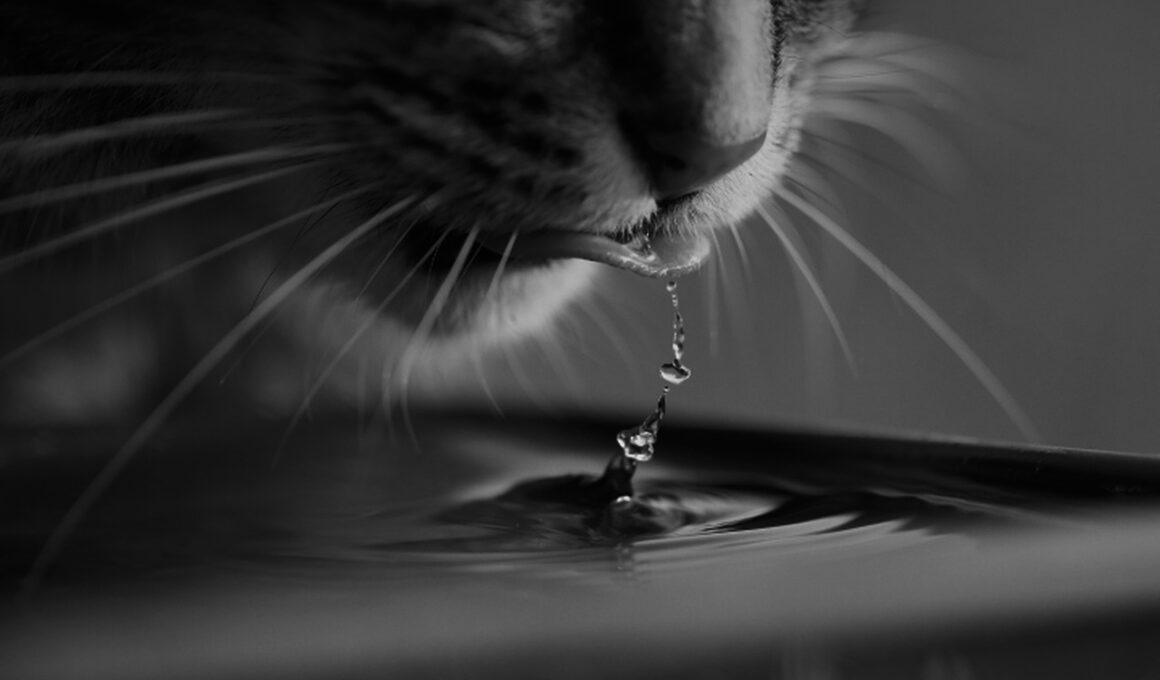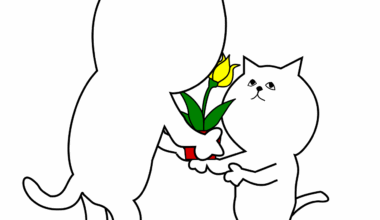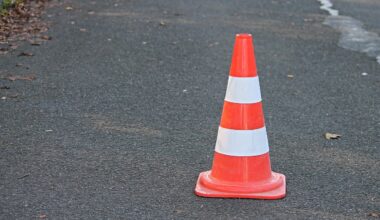Understanding How Aging Cats Benefit from Hydration for Their Teeth
Hydration plays a pivotal role in maintaining the oral health of aging cats. As cats grow older, their bodies undergo several changes, affecting hydration levels. Proper hydration ensures that your cat’s saliva remains consistent, which is essential for neutralizing acids in the mouth. This balance helps in reducing the risk of dental diseases. Cats may not always drink enough water, especially if they’re on dry food diets. Therefore, encouraging water intake through wet food or water bowls can significantly benefit their oral health. Moreover, hydration aids digestion and ensures nutrients are adequately absorbed. It’s crucial for cat owners to recognize signs of dehydration, such as dry gums, lethargy, or decreased urination. Providing fresh, clean water at all times is essential. Consider flavoring water or using water fountains to entice them to drink more. Regular dental check-ups can help assess their hydration levels and overall oral health, allowing proactive steps to be taken when needed. Ultimately, hydration is not just about drinking water; it is integrated into a holistic approach to maintaining seniors’ health. The link between hydration and oral health is profound and cannot be overlooked.
Why Hydration is Crucial for Dental Health
Maintaining proper hydration is vital for multiple reasons related to a cat’s dental health. Saliva is essential in preventing plaque buildup and washing away food particles. When cats are properly hydrated, their saliva production increases, helping protect their teeth. Insufficient hydration can lead to thickened saliva, making it less effective in cleaning teeth. Additionally, hydration assists in maintaining the balance of beneficial bacteria in the mouth. When cats don’t consume enough water, their oral environment can become conducive to harmful bacteria growth. This imbalance increases the chances of developing periodontal disease and gum infections. It’s also critical that senior cats maintain a well-hydrated body to combat the natural decline in bodily functions that comes with age. Specialized diets with high moisture content can improve hydration and consequently aid oral health. Moreover, ensuring that any thirst-related conditions are addressed can also help maintain hydration levels. Pet owners should monitor their aging cats’ drinking habits, providing guidance on amount and frequency. Efforts to optimize hydration will go a long way in promoting better dental health, ensuring a happier and healthier life for our feline friends.
In addition to hydration, providing a balanced diet is crucial for maintaining oral health in older cats. A healthy diet ensures that cats receive essential nutrients that strengthen teeth and gums. Foods rich in antioxidants like vitamins C and E can help mitigate inflammation within the gum tissue. Furthermore, omega-3 fatty acids contribute to overall dental health by promoting better circulation and reducing gum disease. You can enhance your cat’s diet by including dental treats that mechanically clean their teeth while chewing. Incorporating dental care food can also be advantageous as they are formulated to support oral hygiene. Additionally, routine dental care practices, such as brushing your cat’s teeth, should not be ignored. Using veterinary-approved toothpaste ensures that your cat receives proper cleaning while enjoying the process. Even if dental cleanings are needed, improving hydration is beneficial for recovery. Consulting with a veterinarian for customized dietary strategies can help in preventing dental problems resulting from age-related decline. So empowering our senior cats with proper hydration and dietary considerations creates a proactive approach towards ensuring their dental health. It’s never too late to invest time into these practices for their overall wellbeing.
Recognizing Signs of Dehydration
Identifying signs of dehydration in aging cats is essential for maintaining their overall health, particularly dental health. Cats can often hide their discomfort or health issues, making it crucial for owners to be attentive. Common signs of dehydration include dry gums, lethargy, and decreased skin elasticity. You can perform a simple skin turgor test by gently pinching the skin between their shoulder blades. If the skin does not return to its original position quickly, this may indicate dehydration. An increase in thirst can signal underlying health problems, prompting immediate veterinary assessments. Changes in urinary habits, like smaller volumes or more concentrated urine, may also suggest inadequate hydration. In some cases, cats may refuse to eat dry food due to its moisture content, preferring moister alternatives instead. To combat dehydration, increase the availability of fresh water and consider wet food options. Utilizing pet fountains can also encourage hydration, capturing their interest with flowing water. Regular veterinary check-ups will help track your cat’s hydration status. Addressing hydration proactively ensures our senior cats maintain optimal dental health, reducing the risk of deterioration over time.
Certain cat breeds can be more prone to dental issues as they age, making hydration a vital component of their care. For example, breeds such as Persians and Siamese tend to have specific dental health challenges that can be exacerbated by inadequate moisture. Therefore, proactive hydration strategies become even more critical. Tailoring hydration needs based on breed characteristics can optimize oral health prevention. Always consider the specific anatomical features of these breeds, which may affect their ability to maintain oral cleanliness. It’s important to always remain aware of how different breeds may require different strategies for hydration and dental care. Consulting with a veterinarian experienced in breed-specific issues can provide insights into effective management techniques. In some cases, breeders may also provide additional information on managing hydration related to dental care in their breeds. So, understanding your cat’s breed-specific risks allows for targeted prevention management. Investing time into educating oneself about hydration needs can lead to better health outcomes and ensure our feline companions enjoy their golden years without complicated dental health issues. Being proactive with these breed-specific considerations can make a significant difference in healthcare.
Implementing Effective Hydration Practices
Implementing effective hydration practices can significantly improve the oral health of senior cats. Owners should be aware of their pet’s day-to-day drinking habits, adjusting food and water availability accordingly. Consider integrating various hydration methods as part of the daily routine. Offering wet food in conjunction with dry food ensures ample moisture intake. Alternatively, you can freeze water into treats to create interesting snacks while encouraging hydration. This combination approach may also help with weight management, which can lessen the burden on dental health. Regularly replacing water in bowls or providing filtered water can entice cats who are picky drinkers. Ensure multiple water sources are available in different areas where your cat regularly spends time, offering convenience. Every cat has its own individual preference, making it essential to tailor the hydration approach accordingly. Monitoring changes in drinking habits will signal when adjustments are needed. Be vigilant for subtle behavior changes in case of a health issue. Ultimately, consistent efforts to optimize hydration will yield long-term benefits in maintaining their dental hygiene. Your aging cat will be happier, healthier, and less likely to experience dental-related complications.
Preventive care is essential for ensuring that senior cats benefit from optimal hydration and maintaining their dental health. Regular veterinary visits will help to monitor their overall health status as well as their hydration levels. During these visits, be sure to discuss any concerns regarding dental health and topical oral care. They might provide specific recommendations tailored to your cat’s needs, as every individual is different. Additionally, early detection of dental issues can prevent severe repercussions down the line. Developing a healthcare schedule that includes dental check-ups will help in maintaining optimal oral health through hydration. Owners should also educate themselves on the risks associated with dehydration and its connection to dental health. Important education on hydration needs and preventative care also leads to more responsible pet ownership. Remind owners that maintaining your cat’s hydration needs is a significant step toward enhancing their quality of life. Furthermore, making these changes early in life can help establish positive habits for seniors. Emphasizing the connection between hydration and oral care empowers owners to prioritize their pets’ dental health. This multifaceted approach ensures that water plays a significant role in keeping aging cats healthy.
In conclusion, prioritizing hydration in aging cat care can have a profound effect on their dental health and overall wellbeing. Understanding the importance of hydration has become crucial for cat owners, especially for those with senior felines. An effective hydration strategy implements wet food, water fountains, and multiple water sources to ensure that your cat stays hydrated. Utilizing breed-specific strategies ensures that hydration needs are met tailored to individual characteristics. Furthermore, collaborating with veterinarians for routine checks enhances preventative care procedures. Preventive measures can significantly reduce the risk of dental problems, allowing for happier and healthier lives. Being proactive allows you to monitor your cat’s health effectively. It’s essential that you remain vigilant to signs of dehydration and promptly address any anomalies. Consider creating a comfortable and accessible environment for both hydration and dental care. This journey of improved hydration will undoubtedly lead to better dental health outcomes. Overall, hydration directly correlates to your cat’s quality of life. Taking the time to implement these changes can result in remarkable benefits, ensuring that your beloved feline companion enjoys its later years with comfort, health, and happiness.


